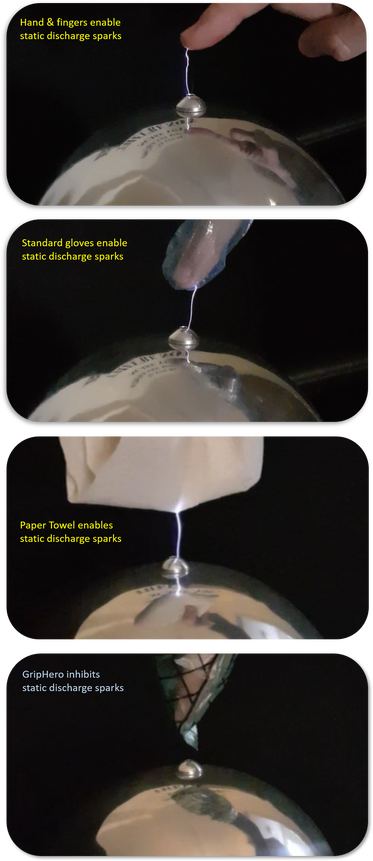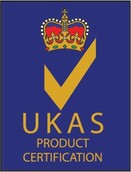Static safety on petrol stations
There are a number of fuel-handling health & safety regulations which govern petrol stations. Shown below, from just one of these regulations, is Paragraph 250 from the HSE's Dangerous Substances and Explosive Atmospheres Regulations Approved Code Of Practice.
Did you know... Standard gloves both generate and amplify static spark energy on the person.
Since 2018, GripHero's Anti-Static ATEX-Certified Safety-Gloves have been preventing and blocking static sparks between the person and fuel equipment.
By providing ATEX Safety-Gloves at the customers' point of contact in the ATEX Fuel zone, GripHero enables full regulation compliance, maintaining valid insurance cover and safeguards petrol stations against fuel-handling injury claims.
"This Approved Code of Practice (ACOP) and guidance provide practical advice on how to comply with the Dangerous Substances and Explosive Atmospheres Regulations 2002 (DSEAR). These Regulations require the elimination or reduction of risk of fire and explosion from substances connected with work activities."
Reference: Dangerous Substances and Explosive Atmospheres Regulations 2002 Approved Code of Practice and guidance, L138 Second Edition, HSE
Since 2018, GripHero's Anti-Static ATEX-Certified Safety-Gloves have been preventing and blocking static sparks between the person and fuel equipment.
By providing ATEX Safety-Gloves at the customers' point of contact in the ATEX Fuel zone, GripHero enables full regulation compliance, maintaining valid insurance cover and safeguards petrol stations against fuel-handling injury claims.
"This Approved Code of Practice (ACOP) and guidance provide practical advice on how to comply with the Dangerous Substances and Explosive Atmospheres Regulations 2002 (DSEAR). These Regulations require the elimination or reduction of risk of fire and explosion from substances connected with work activities."
Reference: Dangerous Substances and Explosive Atmospheres Regulations 2002 Approved Code of Practice and guidance, L138 Second Edition, HSE
|
Are your petrol stations safe and in compliance with their ATEX and DSEAR directives?
They may not be, and your site's insurance cover may be at risk. Testing and certification of ATEX safety gloves ATEX-Safety-Gloves must meet strict requirements regarding their ability to dissipate static electricity and avoid becoming electrostatically charged when used in ‘potentially explosive areas’ or ATEX 'classified' environments (such as the ATEX Zone-1 fuelling zone on petrol stations). Testing under strict conditions and parameters by an Official ATEX Notified Body is required for ATEX certification. GripHero ATEX Safety-Gloves Internationally regarded as the best-practice solution to customer protection, static safety and environmental efficiency - GripHero is endorsed by Health, Safety and Sustainability departments around the globe. It is the world's only ATEX-Certified anti-static Safety-Glove that can inhibit the build-up of static energy and the potential for static discharge between the person and petrol station equipment. ATEX Directive Did you know... for petrol stations to comply with their ATEX Directives, 'Group 1' and 'Group 2' equipment (which includes equipment supplied and used within the fuelling zone) must be designed to avoid becoming electrostatically charged and avoid ignition due to electrostatic discharges. GripHero's highly specialist construction offers two anti-static functions enabling petrol stations to comply with their ATEX Directives over traditional 'gloves' or paper towel: 1) The GripHero protector material can itself avoid the build-up and generation of static energy 2) The GripHero protector material can inhibit the transfer of static energy between the person and petrol station equipment This makes GripHero the world's only ATEX-Certified glove approved for use in potentially explosive areas (including the fuelling zone within petrol stations). GripHero can also reduce the need for expensive and unhygienic 'static-discharge pads' on petrol stations. Dangerous Substances and Explosive Atmospheres Regulations (DSEAR) All petrol stations are governed by DSEAR. DSEAR places duties on operators to assess and eliminate risks from dangerous and explosive substances to as low as is reasonably practicable. Did you know... typical forms of standard gloves generate their own static energy: enough to ignite fuel vapours. Standard forms of gloves also enable the transmission of static energy built up on the clothes of the motorist. The combination of these two factors means that the use of standard gloves can dramatically amplify static energy around the motorist's hands, therefore amplifying and increasing the static risk when used as hand-protection in the ATEX-classified fuelling zones. Are your petrol stations knowingly or unknowingly amplifying and increasing the static risk in an ATEX explosive atmosphere, by allowing the motorist to bring static-generating standard gloves into an ATEX-classified zone (over and above that which the motorist potentially brings in themselves on their clothes)? With GripHero ATEX Safety-Gloves, in accordance with DSEAR, it is possible to simply, quickly and inexpensively mitigate and all-but eliminate the static risk around the motorist and their hands. |
|







